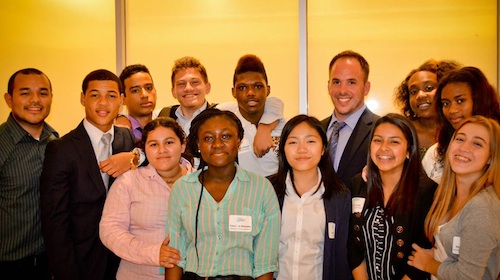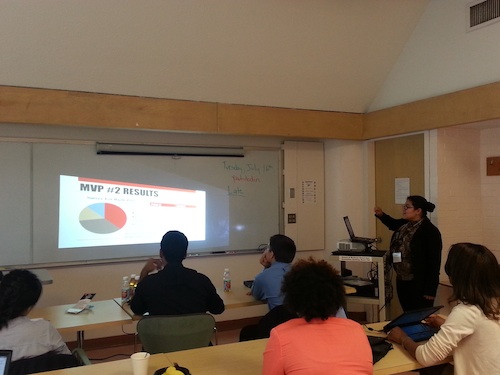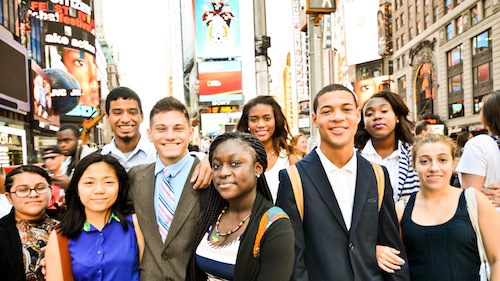NFTE's Startup Summer is an elite program developed by the New York-Metro team with the purpose of getting actual businesses started by NFTE graduates. First piloted in the summer/fall of 2011, this summer the third class brought together 11 of the top New York-Metro area graduates. As an experimental part of this summer's program, the students learned about Eric Ries' Lean Start Up methodology to learn, measure, and build a startup into a successful business. This methodology is a major concept from a powerful book in which Ries argues that entrepreneurs can limit their risk of failure and inefficiency. Ries' simple, straightforward startup approach is based on the idea of a continual adjustment of the product or service, stemming from feedback from the market. In other words, the entrepreneur should adapt his or her work, product, service, offering to the needs articulated in the market; and to pivot whenever necessary. To pivot means to change your product or your market quickly and efficiently.

Carlos Mendoza, Program manager NFTE New York Metro, and Christopher Stahl, NFTE Teacher of the Year, with top entrepreneurship students.
The New York City Startup Summer group at the NFTE offices.
Two young Startup Summer entrepreneurs talked to me about their experiences so far and how they've applied the Lean Startup methodology to their businesses: Vanessa, founder and CEO of Nessa's Chic Braids and Sofia, founder and CEO of Mi Pequeña America. Both of these young women recognized their Minimum Viable Products -- that is, according to Ries, the version of their aspired-to products that is most easily tested on the market.
Steve: What have you learned in Startup Summer so far?
Sofia: I have learned how to communicate with people and how to present my ideas in the business world. I was not used to presenting in front of a lot of people. Now I know how to present, how to deal with customers, and how to network with other people to get support.
Vanessa: Being in Startup Summer has brought a lot of changes to my life. I have seen all the people from last year, and what they have become. I think I can do exactly what they are doing. I am trying my best and thinking positive. Even though there are always obstacles in my way, I stand on my feet just to accomplish what I need to do to get my business out there.
Steve: When last year's Startup Summer alums came to mentor you, what did they share?
Vanessa: We presented [our business plans] to them, and I was nervous to present. I have stage fright. I got comfortable with them when we sat at a table, we felt connected. They were in the same situation that we were in. They gave us feedback. I think it was helpful because we need to express ourselves to new people and represent our business. It's helpful because they are giving us information about what we can get out of this.

Start Up Summer student presents her business idea.
Sofia: For me it was a great day because we were mentored by last year's students. They were giving us feedback, motivating us, and telling us to never give up because there are going to be hard times. But, after the hard work, good things will come. We have to keep looking for our dream and trying to reach it.
Vanessa: They also said that the first thing that pops up into your mind is not always the best thing. There was one student who pivoted five times. Now his business is going well. You might have the best idea in the world, but if no one knows about it you won't make money from it.
Sofia: You can have the best product, but if you don't know how to market it you will fail. You have to understand what customers like and what they want from your product.
Vanessa: One thing I learned from the lean startup -- at first I was so concerned about what I want, not what my customers want. Even if it's just the best product for you, no one is going to buy it. You have to build and test a product to know what a customer wants. Build measurement.
Sofia: Build-measure-learn, based on Ries' principles.
Steve: Tell me more about Build-Measure-Learn and what you learned from the Lean Startup.
Sofia: In [The Lean Startup], we learn about how to construct the economics of one unit. When you have a living business, you have different angles because you have to know how to plan. Know what your goal is. You have to keep focused and keep working. Group work in startup summer has helped us a lot. Everyone has a different business, and we shared feedback, comments and ideas on our businesses. Even though we are all separate and competing, we have to help each other.
Sofia: We had to create a value hypothesis and a world hypothesis -- what was the idea for our business. I needed to see if there was a need for my product so I went to LIU and gave free samples of my product, and people said that it was a great product but priced too low. I went back to increase the price and I have now developed my product further to make it the best.
Vanessa: The idea is to know what your customers want, and whether you need to change your product or something about your product. So what I had to do, like I said before, was change my price and bring it up to a fair price. Next I made a flyer. My first flyer was boring honestly so I needed to test it. I changed it per recommendations. I braided a customer's hair for free. She liked it so I took some pictures so I put it on my Facebook page and I got four likes. Based on that, I also created a business card to give people. I went around my geographic area -- expecting 50 percent of people to call me back. I had a hard time approaching them, and people were rude. I asked whether they would like to go out or stay home for their braiding. I asked them about prices, and they told me it was too high. Right now I am not able to offer my service to all people, because of my security, so I offer it to friends and family.
Sofia: Within Startup Summer, we learned about our vision. That we have to be focused on what we are going to do and where we want to be. We need to be clear and articulate to the world. We are trying to be entrepreneurs, helping everyone. Our vision is to help people understand what we want. And we have ambition to be successful.

Start Up Summer students in Times Square, NY, NY
All photos by Carlos Mendoza.
To learn more about Startup Summer, visit www.startupsummernyc.com.
